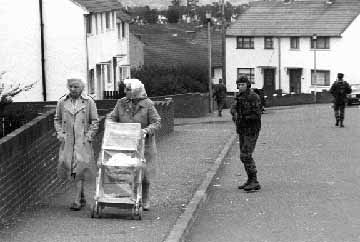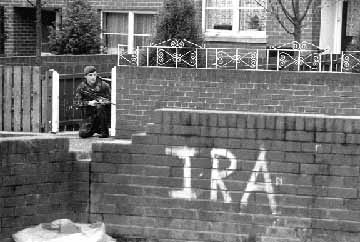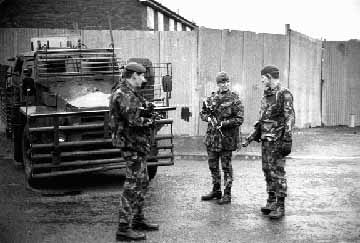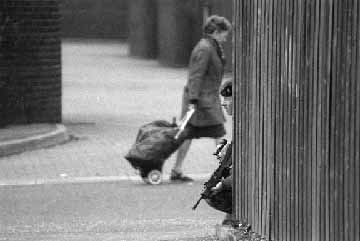Northern Ireland and Ireland:
Violence and Literature
30 August 1991 I am now in Dublin. I spent three days in Belfast, and it filled me with surprise, interest, disappointment, and finally disgust. At first sight, Belfast is a modern, western city with McDonald's, new cars, etc. It would seem not at all different from Dublin, Liverpool, Glasgow - the other places in these islands I have visited. Upon arrival, I was thinking about this and how it did not match its black reputation. Then, not five minutes after my arrival, I walked past a group of combat soldiers patrolling undeniably urban streets. The soldiers held assault rifles, flak jackets and helmets. They walked no closer than 20 yards from each other while constantly spinning and scanning the environs. These soldiers had the look of alertness which signaled fear of attack. Here in the West, in a modern city! It boggles my mind.
British soldier on patrol being ignored by locals.The threat of bombs and terrorism is real in Belfast and yet I know the chances of being hurt are exceedingly slim. So do the locals. It is strange how the people here ignore the soldiers. People rush around self-contained and oblivious to the nervously alert soldiers. Their presence is accepted and ignored. It is almost as if soldiers in the streets camouflage has been a fact of life for so long that it is normal. But it is not normal. I think it similar to Los Angeles in that people grow up in a culture of violence and as adults it almost defines them. In other words, it is a Godforsaken place, like so many other unfortunate corners of the globe.
It seems clear to me that the most serious consequence of terrorism is the mere fact that society feels obliged to place soldiers in the streets. Assault rifles, clothing, armored cars ready to withstand concerted attacks - which, in fact, they do come under - all seem to me an almost obscenity and a sort of capitulation. Soldiers, machine guns, and tanks belong in garrisons or out in the boonies where armies can train for war. They do not belong in the center of cities. God help that we Americans never come to this. I understand the practical need for such security due to the fact that anything less would almost certainly lead to mass violence. But after a day in Belfast the situation began to both fatigue and disgust me. There is no "war" here but there is also no peace.
British soldier hides in doorway.I bought two different books on the conflict - one British and one IRA. I read 500 pages in two days and took a 10 mile walk through the Protestant and Catholic areas identified as the most dangerous: the Shankhill and the Ardoyne. The conflict seems intractable and Great Britain is stuck in the middle. The IRA play down the sectarian violence and play up the Irish freedom vs. British tyranny motif. This is obviously self-serving and simplistic; if the British simply left all hell would break loose and the Catholics and Protestants would kill each other with steak knives if they had nothing else at hand. The authorities spend almost as much time battling the Protestant extremists. The British have hugged a tar baby. Man, getting orders to Northern Ireland must be the ultimate in shit-duty for a soldier in the British Army!
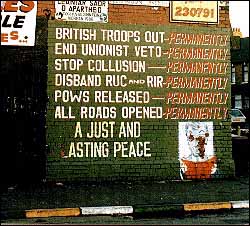
Anti-British mural in Northern Ireland street.
The Belfast slums are scary, reminding me more than a little like parts of Los Angeles. The buildings are huge public housing projects which are falling apart. There is trash everywhere and groups of young men hanging out on the corner somewhat aimlessly. There is graffiti everywhere and it is not ambivalent: giant mural size paintings glorifying "freedom fighters" with black stocking masks over their faces with rifles holding proud military poses! I walked by a police station and it resembled a fort. It was on a deserted, burned out block and an armored car with soldiers inside pointing their weapons out of small port holes entered the heavily fortified 20 foot tall gates as I walked by. It was a scene straight from a "Mad Max/Road Warrior" movie in some post-nuclear apocalyptic battleground. The soldiers drive around for awhile and then get out and patrol, weapons constantly at the ready. The ground upon which they walk is the full extent of their authority, however, as the extremist groups run these areas. I never felt personally threatened walking these areas but I never felt relaxed either. On a bus back to my Youth Hostel, in a supposedly peaceful area and off my guard, I passed a house with police in front with a perimeter guard of vigilant combat soldiers.
British soldiers manning a temporary peaceline
between Protestant and Catholic neighborhoods in West Belfast.Obviously, the extremists have lost their sense of perspective as well as their humanity. In the name of the "struggle" (they see themselves as "soldiers" at war), anything is permissible and limits are arbitrary. The IRA has "kneecapped" (shot persons in the knees) thousands of their own for "disciplinary" reasons; the Belfast doctors are internationally known experts in reconstructive knee surgery. I arrived in Belfast intrigued and left disgusted. I truly hope nothing like this ever comes to the States. Rank tribalism, the near absolute victory of the passions over reason!
In fact, it is merely the same kind of culture of violence as I have seen in parts of Los Angeles. Yeah, exactly the same thing - young men getting off on violence, and then growing into the role as mature adults and knowing nothing else. People skilled in murder who can hardly write their names or read the newspaper. Killers of innocent and not-so-innocent people who plant bombs and wear masks who were unable to rise above their violent pasts. No matter how some people try to glamorize the political struggles here, this holds true. The IRA has covered all of Ireland with disgrace and I am so glad my ancestors left this island for more propitious regions in North America!
And yet, like in Los Angeles, I have no doubt there are plenty of decent if terrified people both on the Catholic and Protestant sides in Belfast who are powerless to stop the violence and simply try to get by the best they can - even in the middle of this Godawful mess!
I will not soon forget my walk through the slums of Belfast.
British soldier on patrol hides behind fence.
31 August 1991 I spent a mellow and enjoyable day in Dublin. I find Dublin as delightful and uplifting as I found Belfast depressing. And this is funny considering Belfast is technically a more "modern" city, due probably to the British taxpayer. Dublin is not an ascetically pretty city. It lacks direction and seems to have been erected somewhat haphazardly. Compared to London, Dublin is nothing. But there is energy and virility here.
As opposed to the North, the Irish here relish their Irishness. The renaissance of the Irish culture under Yeats and others still blooms. There is activity, Gaelic language, crowds, different peoples - the hustle and bustle of freedom. Ireland is a poor country and this fact is much in evidence. Many times I was approached by almost destitute children begging. Everything is a bit older and dirtier than in the UK, but remarkably I don't mind in the least. It is the exuberance of this "writers' city," one can still feel the strength of individual thought as the different trends on display in stores and on persons are plethora. No
matter what the economic reality, one gets the impression of a free country living out its life vibrantly looking to the future, rooted in a shared national past.
The streets are packed with young people. Some of them are couples in love, some are religious, some "punkers," some skateboarders. They are all in their little cliques and this somewhat disorganized menagerie smacks of individual initiative; let a hundred different manners of thought flourish and let the competition of ideas follow! Subjugating a population to some approved dogma induces intellectual laziness and spiritual dullness. Freedom is often obnoxious and messy but it stretches the mind and raises the level of thought and self-respecting individualism.
The Irish are poets, lovers, and somewhat pathetic in a lovable way. They are poor and not especially rational in the cold-blooded English manner. They are writers - religious enthusiasts. No politicians here talk about the high unemployment or GNP numbers or GATT negotiations. They talk about morality: contraception, divorce, abortion, sex, public morality.
The Catholic Church is especially strong here. I think this both good and bad. Good in that it provides a certain moral warmth. Many people here support the vague idea of a fully Irish Ireland (ie. UK out of the North) yet still hate the IRA out of a simple moral response to their tactics, which is commendable. Yet Catholicism here is sort of fanatical and there is a strong sense of guilt, sin - hell, itself. They subordinate a degree of sovereignty to blind obedience to the edicts of the Church, and their views about sex are clearly antiquated, at least among the old. Divorce is illegal, as is abortion - one can only buy contraceptives in pharmacies with a subscription! Yet there seems to be a conflict with the young on these matters and who knows, perhaps Ireland has a sexual revolution in their future? I hope so.
There is a frank pro-Americanism here. I do not know if massive immigration is the reason, or tourism or investment. There are American movies and flags everywhere. American food, American icons (Tom Cruise even) everywhere. I heard today that "all Irish want to be Americans and all Americans want to be Irish." I don't agree with that but there is a definite love affair. Socialists protesting foreign investment notwithstanding.
There is an anti-English sentiment here leftover from the days of colonialism and Cromwell. At the tourist office I was told lodging were hard to come by because of an "Irish football" tournament in Dublin at the time. I asked if this was like soccer and was told somewhat testily, "NO! Soccer is English!" I am of Irish descent and my parents can remember relatives who spoke with an Irish accent. But I was offended by the anti-Englishness! As an American, I feel historically closer to England than to Ireland. Great Britain has been a close geopolitical ally of the United States during my lifetime and British and American soldiers have fought and died often together. I guess I am a thoroughly assimilated American. I look at the English treatment of Ireland as reprehensible but ancient history, and at the least an obscure chapter in the larger story of the Empire of Greater Britannia. Or the world for that matter. In global terms, Ireland definitely is a backwater both politically and economically.
But one cannot help loving the Irish for their fire. The Irish are drinkers, fighters, writers. They are always in a passion: a fit of Dostoyevskian guilt or redemption, in a murderous rage or romantic swoon. They produce poems and songs and theater and almost no industry. They are poor and somewhat helpless but proud and dignified. The poverty is plain to see and I have stumbled upon some nasty fist fights flowing out of pubs. But there is a warmth and glow to this city!
1 September 1991 Freedom. Is there anything more important? Freedom in its many incarnations: political, emotional, financial, ideological.
Perhaps one must view freedom from its opposite - slavery. Enslaved to a tyrant, enslaved to a debt, enslaved to a lover. In the absence of freedom there is frustration, anger, and a general cramping of the spirit.
I used to think, relative to the rest of the world, people convicted of heinous crimes had it easy here in the U.S. Free meals, clothes, etc. Basically, they live a pain free life (at least, no extraordinary abuse from the authorities), except for the fact they cannot leave the prison. It is a long way off from the gulag or a Turkish prison. They live in a brutal and sadistic environment, but they are, of course, no stranger to this and adapt to the exigencies of respect, intimidation and retaliation. But on a higher level they have lost their freedom. Your life is dictated: you are told when to sleep, when to eat, shower, etc. What could be worse? - I would almost rather suffer corporal punishment. To live locked up in a cage like an animal, there is nothing worse, except perhaps hunger, that is more demeaning.
To be a free man. To walk where and when one wants. To be free to speak and think as you wish. In the hierarchy of needs, freedom is a pretty high-level concept. No man cares about "freedom" if he is starving. If he is starving, he wants food. Period. But then we arrive at the Faustian dilemma. To "sell your soul" for a material gain is to one day bitterly rue the "loss of your soul." For example, there is a relative lack of dire poverty in Castro's Cuba compared to the rest of Central America and this is due in part to the dictatorial powers ascribed to the Communist Party and the external aid of the Soviet Union. But one is not free to let the mind wander or to develop any though or activity which challenges the official party line. No man can keep his self-respect if he feels that he is unable to make up his own mind or follow his spirit where it takes him. And a jailed man can only hate his jailer.
The recent Soviet coup attempt dramatized exactly what the world had to lose with the revival of Soviet totalitarianism. It is best highlighted by who were elated by the coup: Cuba, Iraq, North Korea, Libya. The failure of the coup must indeed herald the end of totalitarianism and spy government everywhere. Or at least I will dare to hope so.
We in the West have won the Cold War. But what does that mean? I do not think this really means "capitalism" had defeated "socialism." Although pervasive socialism has been shown to be impractical at the macro-level, capitalism can only be a part of the cure. The issue really turns on the issue of pluralism. I think of the West and its freedom and the images of energy and chaos come to mind. A thousand different schools of thought and a culture which is full of color and diversity! I look at all the various factions in the United States and many of them repulse me, or worse. The black and white extremists, with their militancy and hate, the feminists and their knee-jerk reaction against all things male and masculine, and the radical homosexuals and their in-your-face sexuality - how exhausting! But I am fully committed to a state and society which is big enough to contain all of this. When I listen to fundamentalist Christian activists, all I usually feel is anger and frustration. But while I would not want them as dinner guests, I wish them well and believe in an America which has a place for them. Friction between ideologies and moralities is the American way, and this creates dissension and acrimonious debate. In the long run, this only adds up to a stronger union. That is if they can get past their differences and observe tolerance.
Soviet strength was hollow, as their ideology was bankrupted and the people only mouthed the religious incantations of Marxist-Leninism. There was no thriving culture of thought. There is desperation, fear, and a dulled peace. The chaos of the West is contentious and threatening, but as Jefferson said, "The tree of liberty must be refreshed from time to time, with the blood of patriots and tyrants. It is their natural manure." - although, I do not see bloodshed as a desirable result of public debate or give-and-take interaction. Like Le Carre, I wonder if "the right people lost the Cold War and the wrong people won it."
I went out pub hopping yesterday. There was a "hurling" game today here (hurling: a combination of field hockey and football) and the fans were everywhere with their colors. Pubs, here like in England, are smoky and filled with gregarious good cheer. There are large numbers of older men. It is very social with many couples and a lack of the hard lonely atmosphere that many American bars exude. I went to many pubs and read Yeats while drinking Guiness beer (yuck!). The highlight must have been in the pub across from Yeat's Abbey Theater. I tried to feel his spirit by reading his poetry so close to the theater which he worked so hard on and which was dear to his heart.
The pubs of Ireland are full of friendly and smiling people.
September 2, 1991
I find myself today at Rossalere Harbor awaiting transit to Le Havre, France. The trip is 22 hours and should prove tiring. I am continually oppressed by the smells of body odor and cigarette smoke.
I almost wish that I could spend more time in Ireland. The Irish are friendly and warm hearted. There is a simple kindness no strings attached that is rarely seen in the States. Perhaps this is the answer to the riddle of why Americans want to be Irish and vice versa: the Americans wish to have the warm sense of community of the Irish while the Irish want to be "rich" like the Americans. It sounds to me like wishful thinking on both sides coupled with misconceptions about how life is elsewhere. People see what they want to see - me included, I am sure!
I think now I understand the position of expatriates who live overseas yet write about their native land with so much passion. It is difficult to generalize about a place as big as the United States, but I have been thinking much about home here in the relatively removed setting of Europe. I see well clothed and well groomed persons walking through corridors of corporate glass feeling both exhausted and unrewarded by their bosses and asking themselves, "Is this it?" Marketing reports, spreadsheets, ultra-competitiveness, and the bottom line alone do not confer meaning and happiness in life. I personally know many people who give 100% at work only to return home at night to Nothing. Weekends are the worst, relieved only by the coming of Monday and more work. Everything in pragmatic America is value: how you can benefit someone with your skills or time, and what you can market that people will buy. Our holy places are the efficient and productive office, overflowing with the frenetic energy of success and the icon of the West: the computer, our indispensable partner in taming a slippery fate.
But beneath the trappings of power and prestige there exists a sense of hollowness and despair. "Fun" is not something you can buy. In the hustle and bustle of success and 100 mile per hour lives full of hassles and hurries, we become slaves to our concerns and our humanity is unacknowledged. I think most people would be satisfied with less in the sense that they could enjoy life more if they were not so overextended. I think Americans are tired of "low intensity conflicts" and petty nationalist hatreds in obscure backlands that are as inextricable and impenetrable as they are irrational and distant. Americans are exhausted: tired of "empire" and the demands and responsibilities it brings, tired of the idiocy of "-isms" and "-ions," and mass movements and the juggling job and family and of being cynically manipulated and lied to by the politicians. The future seems to auger a return to the inner life á la Walden Pond. It is a time of pessimism and resignation in terms of what can be done politically. Bitter and intractable problems eat at the fabric of American life.
Americans have been suspicious (rightfully, to my mind) of politics since day one and our vision of government is more about freedom from than about anything else. Its whole architecture conspires against concentrated power and it is conspicuously lacking in the ambitious and aggressive desire to attain some utopia or ultimate "truth" in government. It is moderate and practical, with a healthy suspicion of itself. One often hears from persons with some political item for sale, "The Greek definition of an 'idiot' is someone who does not concern himself in politics," as if the Greeks were ultimately enviable in their political intercourse. In reality, they were always at each other's throats. They loved to endlessly argue about what is wrong and what is right, what it means to be pious, what is Truth, etc. but they were singularly unable to live in social harmony. Plato was good at turning out abstract theory on which is the ideal government, but his brief and feckless record in actually dealing in the civic affairs of man was pathetically inept. There seems to be a natural incompatibility between political theory and praxis, as if one cannot be talented in both. As John Adams himself said around the birth of the American nation: "Remember, democracy never lasts long. It soon wastes, exhausts, and murders itself. There never was a democracy yet that did not commit suicide."
"To the barricades?" - fools!, that was the mistake of the baby boomers and the 1960's. The public forum is such an absurd cacophony of shrill shouts that one cannot find peace enough to think clearly. Is it any surprise that the youth of today are apathetic and reject the macropolitic? The mood of American youth today: "Perhaps I will join a neighborhood environmental group and plant some trees where I may actually be able to do some good." The sophist's Quixotic search for the ultimate truth is a fool's errand that has nothing to do with helping actual people here on this earth during their lifetime. We are told that the private is the concern of the public. I would counter that the whole history of the fratricidal 20th century is a testament to the rape of the private. People should slow down and really figure out what they believe in and live their lives accordingly. People should remain unmoved by what they are told is the "right" or the "correct." Man holds nothing so dear to him as the independence and integrity of his own thought and it is precisely this that has been so violated by "true believers" with a social agenda, whether they be Nazis or Islamic mullahs or Soviet or Chinese commisars. There needs to be an affirmation of the sovereignty of the individual.
Questions: Is it any wonder that no beautiful flowers will bloom in the embittered soil of America? I look at the rise of fundamentalism whether it be religious, political, or ecological and I wonder why they don't name it for what it really is: fanatacism! Among the public blood lettings in the United States why do we not see that compassion and reconciliation are the very things we kill? As if any kind of justice or forgiveness could be found in such a bitter environs? And how did we let our worst (Jesse Helms and the militant gay performance artists, minority activists and religious conservatives) set the agenda anyhow? - no, I will stop the finger pointing and whining, it has become an epidemic in the United States enough already.
As Pasternak, that tragic genius who lived in times much more acerbic and dangerous than ours, said half a century ago at the violent dawn of the Soviet epoch: "Mood is more important than plot, and contemplation of such problems as poetry and music is more important than ordinary events...political events play a lesser role in determining the role of human lives than does art; coincidences serve to demonstrate the inevitability of fate as well as the meaning of life and the mystery of death." Revolutionary Soviet Russia with her social psychosis was too brutal and violent a place for the gentle and percipient Pasternak. In the fanaticism of his age one did not have the option to remain indifferent. His complex and difficult verse was considered at best irrelevant by the hard and dogma-driven revolutionaries who believed that if only you killed enough people in the name of a cause everything would turn out OK.
September 2, 1991 I have enjoyed European cities for their simple streets crowded with ordinary people out to enjoy the presence of their neighbors with classical music being played by amateurs on the peripheries and magicians plying their trade in the centers. Clean parks and wide terraces devoid of traffic. The American mall may be more efficient but it is much less enjoyable.
The Irish are impoverished, it is true. And my American side which values people in terms of what they have accomplished and their material accouterments was ashamed of the Irish and the children begging in the streets. To my Americanism, if you are not financially successful, or at least secure, you are simply not a serious person. In America, poverty in a land of plenty is seen as evidence of indolence and moral dubiousness. "Why are you poor in a country with so much opportunity?" "Why aren't you out getting yours?" In poorer countries like Ireland, poverty is seen as a misfortune but no shame.
Where in America can one enjoy lively conversation and simple good cheer such as that which is experienced in the pubs of Dublin? In the U.S., kindness towards one another is most often seen initially as a cynical approach to get something (money) from us. It is true, the Irish are something of a childish, irresponsible, and undisciplined people. But there is a color and fullness to their lives which is indicative of a more gentle, kind, and human life than we Americans live. Sure they are most generous and alive when drunk. And most assuredly they have more children than they can afford to reasonably support - but the city of Dublin is alive with the laughter and play of the young.
September 3, 1991 I am an Irish-American, many generations removed from my Irish immigrant ancestors. I have always denigrated my Irishness, preferring to play up my minority Germaness as more profitable and respectable in this world which respects wealth, power, and efficiency while it tramples the poor and the weak. But I saw in the faces of the Dubliners my mother's father and my father's mother: a red-faced man with a wide nose, an Irish cap, and a ready smile and a woman always wearing a tent like dress and possessing a stern and unforgiving morality. I feel that I understand them better and judge them less knowing of Ireland and how it influenced them so much more than it did me, a fully-assimilated American. People in the United States would ask me about my heritage, "Are you Irish, German, English, or Scotch?" I would tell them I was American.
But my parents always spoke about Ireland with a special love. For my part, I always thought this patent foolishness. The Irish influence on our lives was nil. We lived in California for Christ's sake! I never met one relative who spoke with a brogue. We never ever listened to Irish music or anything like that in our house. The only Irishness in our family life was perhaps a biological disposition towards alcoholism. Exasperated, I would tell my parents: "What the hell does Ireland have to do with our lives? It is a poor and small country whose fortunes don't have much to do with those of the United States - much less our family!" But I think about my great-grandfather Dennis Harris Sullivan who worked as a gardener in the castle of an English aristocrat in County Kerry in the tiny village of Kenmare and who in 1919 left Ireland for the United States never to return at the age of 17. I attempt to understand the great-uncle I never met who still spoke with an Irish brogue even as he served as a Captain of Police in Cleveland, Ohio. I can sense his decent Irish love of life and despair in misfortune and how it made him a good cop. And I honor this heritage and hope that I may live up to it.
I respect my Irish past even as the circumstances of my own current life give me much more of an affinity for the English. My great-grandfather might have been a gardener in someone else's castle, but I come of age an educated free man from the most powerful country on the earth.
I am on the boat trip across the English Channel from Ireland to France and it is a full 24 hour trip. We are far out at sea now and the gentle pitching and swaying motion of the vessel on the waves is not unpleasant. I am watching the ocean pass by while drinking an Irish "black label" beer which tastes oh, so much better than American beer, and hey, life could be worse!
![]()
